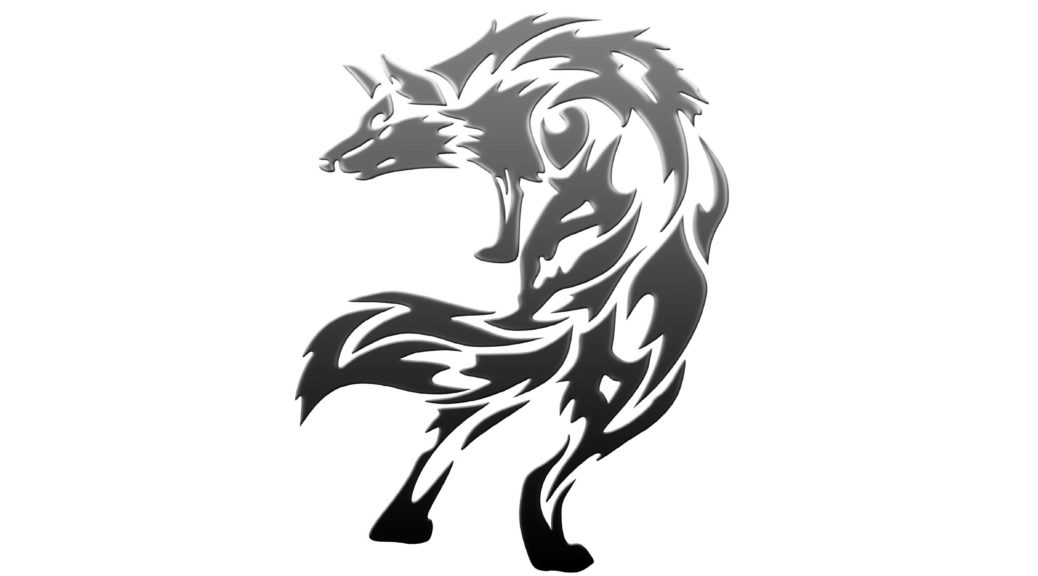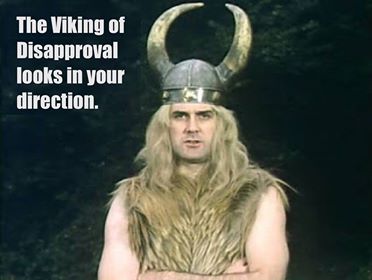That got your attention? Good. Well, at least you know where the Rational Heathen stands. After
 \
\having dealt with enough of these morons, I’ve come to the conclusion that at best, reconstructionists are misguided. At worst, they’re idiots. I say this with the utmost candor, having dealt with reconstructionists when I first got involved in online Heathenry. I even got thrown off a list for expressing my views, albeit politely. (Yeah, me being polite — go figure.) I was told in no uncertain terms I was wrong for my opinions and ideas, and when I logically tore them to pieces, they resorted to ad hominem attacks, and then throwing me off their list. Oh, and then banning me. Like that really showed me?
Seriously? Seriously??
Ad hominem attacks are a clue to me you really don’t have your shit wired, and at this point, the best you can do is just insult me. Yeah, that won the argument. Throwing me off the board and banning me just proves your opinions can’t stand scrutiny. Which is why you should never go toe-to-toe with The Rational Heathen without having your arguments well thought out.
What is Reconstructionism and Why Should I (or Anyone) Give a Shit?

At first, you might think that I, the Rational Heathen, would be a complete reconstructionist. After all, I’m all into logic and learning how and why things came into being. Reconstructionism, at its core is trying to learn and ascertain how northern paganism came into being, what constitutes northern paganism, and what influenced it later. This actually sounds right up my alley in a lot of ways. Many reconstructionists tend to be atheistic or agnostic in nature. They like playing anthropologist, and look to archaeology for clues how heathenism came into being.
Okay, that’s good. That’s insightful. I’m good with that so far.
They look at the sagas and Eddas as being tainted by Christianity. That any semblance of Heathenry is corrupt in them and therefore they are unreliable. I can kind of agree with that. The reason is we know that these stories were written down by Christians, during a Christian time, and we’re looking through an incomplete glass, one that wasn’t written down completely true to form, and one that was written well after the people became Christian.
The sagas are a lot like like me writing down the history of the old West with only oral stories handed down from my in-laws who were told the stories from people who are now deceased. Imagine if we only had stories our families told, and no written journals, newspapers, books, or anything else during that time. Of course the stories I would write down would be the ones that the tellers remembered being told, would be changed enough to reflect the tellers’ points of view, and might even have gotten mixed up with other stories of that time. So, yeah, I think that the idea to question the veracity of the sagas are well founded, to a certain extent.
When the Reconstructionists Go Too Far

So, with this agreement, why aren’t I in the reconstructionist camp? I’m not against the concept of reconstruction, per se, I’m against the way it is being used in arguments. I’ve read through enough reconstructionist babble to decide that they’ve gone too off the deep end when it comes to trying to recreate our beliefs. They argue point after point against those who do use the Eddas, Havamal, and Unverified Personal Gnosis to beat people into submission, when the reality is when it comes to science, we really don’t have a full picture what Heathenry was to our ancestors. What’s more, they don’t seem to care that if Heathenry is to remain relevant, it must be relevant for ourselves and not necessarily for our ancestors.
The Greatest Problem with Reconstruction
The greatest problem with reconstruction is that we just don’t have enough evidence to say “Yea verily, this is how it was.” We have a lot of good educated guesses by really smart dudes with letters after their names, but we don’t have proof other than what others have wrote about the northern pagan cultures and what those people left behind. We also have traditions and folklore that went back to those times, but piecing those bits into actual fact is like trying to put together one shattered cup from a pile of shattered pieces of several cups that have been left outside for years. Yes, you might get something together that looks like the original cup, or you might be missing pieces, or you might have put several pieces of another cup into the cup you were trying to restore. And even if we want to put together this cup, is it something we put on the shelf and look at it, or is it something we use?
I’d argue that the reconstruction folks are more along the lines of putting it in a nice display case to look at from time to time. They’re not the ones who take the cup out and actually use it the way it was intended. They’re interested in the cup as the prize and not as what the cup does for anyone, metaphorically speaking, or they’re using it as a weapon against other people. It’s still a cup, but it’s being used as a hammer to slam people who actually agree with multiculturalism in Heathenism. But it’s not the right tool, and because it’s made from broken pieces, it shatters pretty easily.
Hitting a Running Horse While Blindfolded

Reconstructionists, if they had their way, would fix heathenism in some arbitrarily agreed to point and time. What time, I have no fucking clue, because religion and religious beliefs change over time, even in the Viking Era. They’re trying to hit a running horse while blindfolded. If you look at current religions of today versus even three hundred years ago, you’d see some pretty stunning changes. Christianity is a good metric because we know so much about it. Ask yourself was Christianity looked like three hundred years ago and compare it to today. Yes, there are going to be similarities that we recognize, but there are also going to be stark differences in celebrations, attitudes, and even belief systems. Add the remoteness of some villages, and you’re likely to see even more differences geographically.
We know that during the Viking Age our ancestors went, well, everywhere. The Vikings went everywhere in the known world. We know they were in Sicily (conquering it twice, once by the Norse with Bjorn Ironsides and once by the Normans), Russia (the Varangians), and in Slavic countries. They went west toward the Americas, east far enough to have genetic mutations that are only found in people with Mongolian ancestry in Iceland, south into Sicily and did have dealings with Muslims, and north, well, they are Norse. There is a black Heathen mentioned, for the gods’ sake! I’ve seen Viking caches that had a gold Buddha in with all the other treasure in a museum display. Think about that and tell me that Northern Paganism wasn’t influenced by other groups. The answer is that they were. Which means there is no way we could distill what a pure Heathen was like at any point and time.
When Reconstructionists Go Bad
Many reconstructionists are a sorry lot. They want to espouse their own world view as fact and use what few bits of what archaeologists have recovered to support their assertions. They’re kind of like the Catholic church that insisted on an Earth-centric view of the cosmos instead of accepting that the Earth revolves around the sun, and not the other way around. If they just would bend a little and look at reality with an open mind, they’d see it all fall nicely into place, instead of trying to shoehorn their own beliefs like the proverbial square peg and round hole.
What’s worse, they seek to alienate the people who would do Heathenry the most good. I’ve heard them call those who try to incorporate other pagan traditions into Heathenry derisively as “Wiccatru,” and while I’m clearly not Wiccan, and don’t think much of spells (and don’t believe in magic, per se), I don’t think discouraging that branch of potential heathens is helpful. There are the Rokkatru folks who honor the Jotnar, whom the reconstructionists say can’t honor those beings because nobody in the past honored them (Like they were there? There may be no evidence of worship, but you just can’t prove a negative, especially with our lack of archaeological evidence.) Then, there are the Lokeans, who have to deal with the Marvel jokes. Maybe I don’t see eye to eye with Wiccans, Rokkatru, or Lokeans, but that’s not the point. The point is we have people who want to know our gods and our beliefs — there is no reason to exclude them.
Some reconstructionists go as far as to be tribal. If your ancestors were not from a particular German hamlet, or didn’t come from Norway, they don’t want you as part of the team. Dudes, quit goosestepping in your parents’ basement. Race is a construct. We’re all a bunch of inbred monkey cousins with some very small genetic adaptations. Deal with it.
Our Worldview is Different — Thankfully
Let’s face it: our worldview is vastly different from our ancestors’. We don’t hold slaves and most of us find slavery repugnant and downright wrong (I say “most of us” because I know of some whack-jobs who probably think it’s okay). We find the idea of human sacrifice to be abhorrent (everyone except the guy I argued with in a group that said that he understood why it happened and wouldn’t, when pressed, be against it), and value the individual.
The Individual in Heathenism
Some reconstructionists would like to point to the family as the smallest acceptable unit and would like to claim that Americans (and Christianity) puts emphasis on the individual only, and not the tribe. This is patently absurd. Here’s why.
Looking at Anglo Saxon texts such as the Seafarer and Beowulf, not to mention the Norse Eddas, seem to point to accomplishments of individuals. If you look at Bronze Age folklore, it’s not the family who triumphs in those stories; it’s the individual. Last time I checked, Cinderella’s stepmom, stepsisters, and her dad were pretty worthless when it came to helping her. Cinderella gains help from a fairy godmother who is pretty much a stranger.
What about other stories? The Smith and the Devil, considered a pre-Christian, Bronze Age tale is about an individual who outsmarts an evil entity, similar to Tom Tit Tot or Rumpelstiltskin in many ways. In each of those stories, the hero must overcome the evil creature. That isn’t a question of family, per se, but a question of dealing with an evil creature. The stakes become high when the creature asks the hero not for her soul, but her offspring. In Smith and the Devil, the devil asks for the smith’s soul in return for granting him a magic power.
Oh wait! Those stories are corrupt with statements about the Christian god. Okay, well what is there about Christianity that makes it individualistic? The Catholic church didn’t exactly value others worshiping other religions, or even making it up as you go. In fact, Christianity before the Protestant reformation said that the only way to salvation was through the Church and its sacraments. You couldn’t just read the bible for yourself and decide what was right or wrong. You needed the Church to do it. Doesn’t sound particularly individualistic to me. Guess what? It wasn’t.
 You are Tainted
You are Tainted
If you’re a reconstructionist, you need to be at least open to allowing Heathenism to grow. Trying to reconstruct a religion from more than a thousand years ago from a dead culture is like trying to preserve a time capsule that never existed. You may construct something, but it’s unlikely it is something that resembles what was there in the past. It’s a lesson is futility. Your current world view is based on what is around you. You will never, ever come close to what our ancestors were like in your attempts at mimicking them. For one thing, technology has tainted you. Your language has tainted you. Your education has tainted you. Your nation and how it has evolved has tainted you.
The gods are not stagnant beings. They don’t just hang around and wish for the halcyon days of the Viking era. They know it’s folly to look backward. If they wanted that time saved, don’t you think one of them could have saved that puppy in a time capsule somewhere and trotted it out for all to see?
We Need to Be a Big Tent

You’ve heard the terms big tent and small tent when it comes to politics. It works for religion, too. There’s enough room under the Heathen tent to be inclusive and open to other ideas, and other people. Yes, there are going to areas where we disagree, but that’s normal. We need people with new ideas and new perspectives on our beliefs because otherwise we remain stagnant. Heathenry should not be something that sits on a shelf to show everyone how cool and smart you are. Heathenry is a celebration of our gods and the old ways
as they pertain to today. We know through science that we’re one tribe, not many, although we have different ethnicities. We need to find common ground with people who want to be included. The only people we should not include are those not willing to consider other viewpoints and whose sole purpose is hate. We’ve had enough hatred thanks to the perversion of our beliefs.














 \
\




